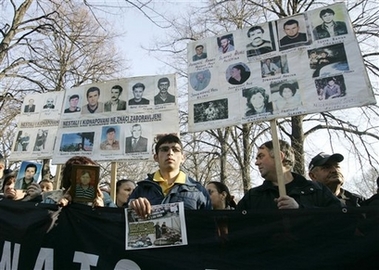UN envoy unveils Kosovo proposal
(AP)Updated: 2007-02-02 22:08
PRISTINA, Serbia - A UN envoy on Friday unveiled his long-awaited plan for Kosovo, a proposal recommending internationally supervised statehood for the contested province where separatists fought a bloody war with Serbia in the late 1990s.
 Kosovo Serbs hold pictures of relatives, who were missing or killed in Kosovo, during a protest in front of the Serbian presidency building, in Belgrade, Serbia, Friday, Feb. 2, 2007. [AP]  |
The proposal handed to Tadic by UN envoy Martti Ahtisaari does not mention the word "independence," but gives Kosovo the go-ahead to adopt its own constitution, the ability to negotiate international agreements, and a right to apply for membership in international organizations, according to highlights obtained by The Associated Press.
Parts of the plan shown to the AP call for a multiethnic Kosovo "governing itself democratically and with full respect for the rule of law."
"I told Mr. Ahtisaari that Serbia and I, as its president, will never accept Kosovo's independence," Tadic said in a statement released after their meeting.
The statement said that because Serbia still has no parliament after last month's elections, he will discuss the proposal with the country's political leaders.
"I am convinced that we will find a way to continue the national and state interests" over Kosovo, Tadic said.
Ahtisaari later flew to Kosovo's provincial capital of Pristina to meet with the ethnic Albanian leadership.
The plan, which would need to be approved by the UN Security Council, set out terms for "a future Kosovo that is viable, sustainable and stable."
After his meeting with Tadic, Ahtisaari refused to say whether his proposal would lead to Kosovo's independence.
"It is a compromise proposal," he said, adding that consultations between the parties could be held later this month.
"I'm willing to integrate compromise solutions that parties might reach, and I will then finalize my settlement proposal for submission to the UN Security Council," Ahtisaari said.
He added that in their meeting, Tadic repeated Serbia's "well-known" stand on Kosovo. Serbian officials have repeatedly said they would never accept an independent Kosovo.
Kosovo has been a UN protectorate since 1999, when NATO airstrikes stopped Serbia's crackdown on separatist ethnic Albanian rebels. Nearly 10,000 ethnic Albanians were killed in the Serbian onslaught, and nearly 1 million were forced to flee their homes.
The Albanians, who account for 90 percent of Kosovo's 2 million population, have rejected Serbia's offer of broad autonomy and demand outright independence.
Diplomats said the plan would disappoint both sides of the ethnic divide.
"The Serbs will have to accept the loss of Kosovo," a Western official said, and Kosovo's Albanian majority "will have to accept continued international presence, significant limitations on their sovereignty and a very generous package of rights for the Kosovo Serbs." The official spoke on condition of anonymity because he was not authorized to discuss details of the plan with reporters.
The European Union urged both Serbian and ethnic Albanian officials to discuss the plan "in a serious manner and without reservations."
"Both sides must demonstrate responsibility, flexibility and a recognition of the need for realistic compromised-based solutions," the EU said.
Trappings of independence would include a flag and anthem along with the right to seek membership in international organizations - although a seat at the United Nations would by no means be assured.
If the proposal eventually wins Security Council approval, that would set the stage for the U.S. and other countries to formally recognize Kosovo's independence. But there were concerns that the plan could trigger a showdown between the United States - long an advocate of an independent Kosovo - and Russia, a traditional ally of Serbia that wields veto power.
In a snub to Ahtisaari, Serbian Prime Minister Vojislav Kostunica refused to meet with the former Finnish president, who met with Tadic instead.
Kostunica, a nationalist, is a critic of Ahtisaari, whom he has accused of siding with Kosovo's Albanians and of ignoring Serbia's claims to Kosovo as the heart of its ancient homeland. Kostunica also has threatened to cut off diplomatic ties with any country that recognizes Kosovo as an independent state.
Only about 100,000 Serbs still live in Kosovo, and many complain they are subject to discrimination and reprisal attacks. Some of them expressed doubts that the plan would adequately protect their minority.
For Serbs, the plan outlines "a high degree of control" over their own affairs by granting them six new Serb-administered municipalities and a greater voice in the higher education and health systems. Serbs also would be granted "extensive municipal autonomy in financial matters, including the ability to accept transparent funding from Serbia."
The plan recommends the establishment of an international representative - similar to the office set up in Bosnia after that country's bloody 1992-95 war - to oversee daily affairs.
|
||
|
||
|
|